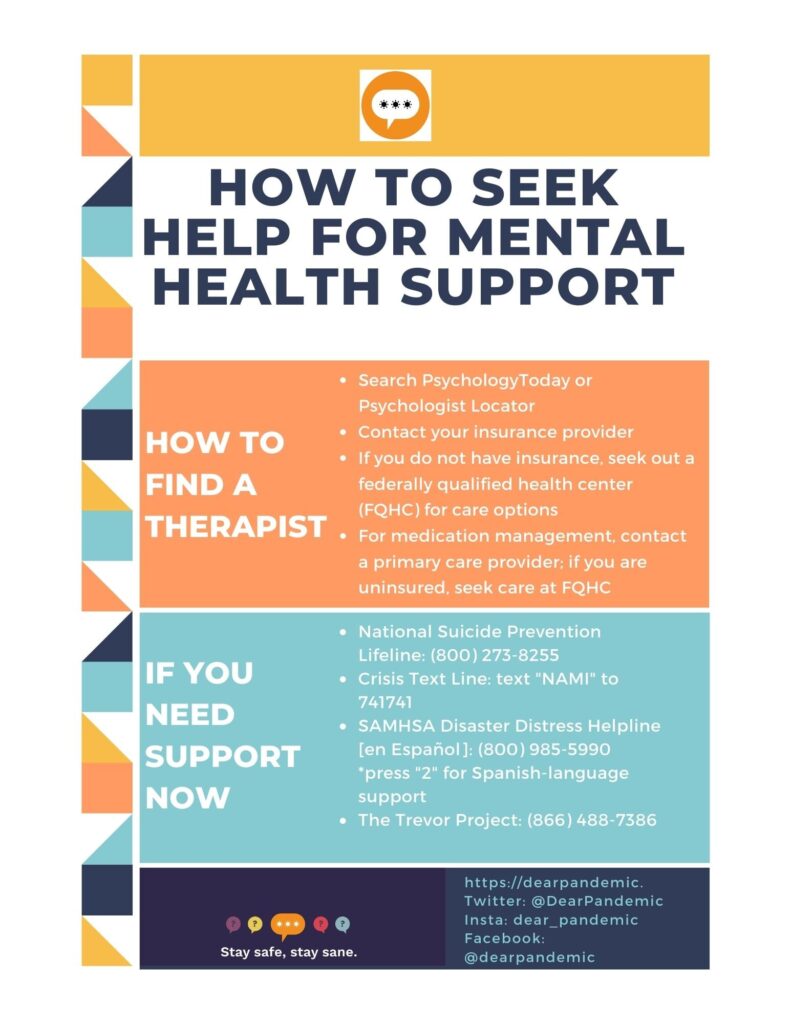Q: I am struggling with my mental health right now. Nothing I have tried has worked. I think I need a therapist. Where do I start?
A: We have a few tips to help you get the help you may need.
Many of us are going through this right now (up to 40% of Americans report struggling with their mental health and substance use since the start of the pandemic) and we thank you for asking openly and honestly about how to find help.
ℹ️ You may need help if you notice any of the following (although this list is not exhaustive):
💤 Sleep disturbance (too much or too little)
🥡 Appetite change (higher or lower or weight changes)
😟 Anxiety symptoms (worry, fear, avoidance), depressive symptoms (low mood, irritability, anger, low motivation, thoughts of harming yourself)
😿 Withdrawal from peers and activities
😵💫 Difficulty concentrating, fatigue/low energy
🤢 Physical symptoms (aches and pains, headaches)
AND
…these issues make it difficult for you to get through and function in your daily life.
💁🏽 Once you have determined that you would like to seek help, you can either search the internet for a provider on Psychology Today or the psychologist locator. You may also call the back of your insurance card/check the website to see who is in network for your care. The amount covered and the provider locations/facilities covered may differ between your physical and mental health coverage, so be sure to check. From there, you can determine what the out of pocket costs may be for a therapist’s weekly sessions. Even if the cost seems high, remember that your therapist may offer sliding scales and/or you may be able to get some out of network reimbursement from your insurance company (where the insurance company pays a portion of your cost). If you do not have insurance, you may link to care through the nearest federally qualified health center. There are also websites that can help you find resources that may be low cost or free to you as well like Thero.
💻 If getting to an appointment is a concern, note that many therapists are offering services virtually, so make sure to ask. In addition, some therapists operate completely online. A few online resources where you could receive therapy from the comfort of your home include BetterHelp, Talkspace, and Join Real.
💊 You may also seek medication management for acute symptoms such as panic attacks. A first step would be to consult with a primary care provider. If you do not have one, you may seek one through your insurance network. If you don’t have insurance, you can connect to the nearest federally qualified health center.
🆘 If you are in a crisis, you can text “home” to 741-741, the Crisis Text Line or call the National Suicide Prevention Lifeline ‘1-800-273-TALK (8255)’ or the SAMHSA (Substance Abuse and Mental Health Services Administration) National Helpline [1-800-662-4357 (HELP)]-all are operated 24/7.
🏥 If you are able to take yourself to get care, you may first start by visiting the nearest emergency room or crisis center. There you will be evaluated and connected to care if needed, such as an intensive outpatient program or partial hospitalization program (where you could receive group and individual therapy as well as medication management in a daily format-although most programs are now online). If you are in acute danger of harm to yourself or others, it may be recommended that you are admitted to the hospital for inpatient psychiatric care. This can be done voluntarily (you sign the paperwork for admission) or involuntarily (the provider and/or a person in your life who has witnessed concerning behaviors sign the paperwork to have you admitted to the hospital). If you aren’t sure where to start, you may also seek additional help in determining what may be best for you by calling any of the numbers listed on the flyer.
🤝🏾 After you receive immediate care, you may need follow up care. Treatment is a process and while you may have ups and downs, staying engaged helps you to continue to develop the coping skills and connect to resources that may support you in the long run. Most people will start to improve within a few months, but many will benefit from treatment of at least one year.
We are committed to continuing to provide you the support you need to manage your news, scientific information, and wellness during this pandemic. Know that you are not alone in seeking help and that many of us do get better with support and treatment.
Stay Safe. Stay Sane.
With Love,
Those Nerdy Girls
Additional Resources:
CDC COVID-19 and Mental Health
National Alliance on Mental Illness (NAMI) Resource and Information Guide
American Psychological Association-Types of Therapy
Summary on Mental Health and COVID-19



